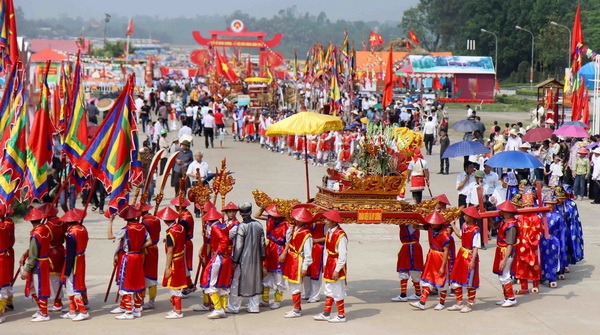Worship of Hung Kings, intangible heritage of humanity

The commemoration of Hung Kings, known as the national death anniversary, is often from the eighth day to the eleventh day of the third lunar month with the tenth day observed as the major event.
The ritual part of the commemoration feature incense offerings to Lac Long Quan, the father of the Vietnamese people, and his fairy wife Au Co, the mother of the Vietnamese people, tributes to ancestors, and ceremonials to pray for peace and prosperity for the country and people.
The festive part is varied, ranging from cultural, music and sport activities, like Xoan singing, Chung “square rice cake’ and Day “round rice cake” making contests, to crossbow shooting and folk games to introduce Vietnamese distinctive culture to visitors to the event.
Last December, the worship of Hung Kings was honoured by the UNESCO as part of the Intangible Cultural Heritage of Humanity. This was the organisation’s first recognition of an ancestral worship ritual as an intangible cultural heritage of humanity.
Legend has it that Lac Long Quan, son of King Duong Vuong married to Au Co, daughter of King De Lai. Au Co then gave birth to a pouch containing 100 eggs from which 100 children were born. The couple then decided to separate in order to populate the land and propagate the race, so half the children followed their mother to the highlands and the remaining half went with their father to the sea.

The first child went with mother Au Co to Phong Chau, now Phu Tho province. He then became King Hung and founded the first nation in the history of Vietnam , called Van Lang.
Ruling the country through 18 dynasties, Hung Kings taught people how to grow wet rice. They chose Nghia Linh mountain, the highest in the region, to exercise rituals devoted to rice and sun deities to pray for favourable weather conditions and lush crops.
To honour Hung Kings’ great services, a complex of temples dedicated to the Kings was built on Nghia Linh mountain, and the tenth day of the third lunar month was designated as the annual national death anniversary.
On the way from the foot to the top of Nghia Linh mountain, around 175 metres, there are the Ha, Trung, Thuong, and Gieng temples.
The Ha temple is where Au Co gave birth to a sac of 100 eggs while the Trung temple is where Hung Kings and his aides met to discuss pressing affairs of state.
The Thuong temple perched on the top of the mountain is where rituals were held for the Kings to pray for peace and prosperity for the nation and the Gieng Temple was built in memory of the princesses of the last Hung King dynasty.
On the mountain on September 19, 1945, at his talk with pioneering Vietnamese military troops, President Ho Chi Minh said: “The Hung Kings had the merit of founding the country, you and I must work together to protect it.”
The worship of Hung Kings has been preserved and spread from generation to generation despite ups and downs in history. There are 1,417 temples dedicated to Hung Kings and numerous temples honouring Au Co scattering across the country.
The Hung Kings Temple Festival demonstrates a strong desire for national prosperity and symbolises community spirit. Coming to the festival is like returning to the ancestral land, a customs that deeply rooted in the mind of Vietnamese people in and outside the country.
What the stars mean:
★ Poor ★ ★ Promising ★★★ Good ★★★★ Very good ★★★★★ Exceptional
Latest News
More News
- Manila becomes a new check-in destination for Vietnamese youth (December 11, 2025 | 18:07)
- Vietjet launches mega year-end ticket promotion (December 10, 2025 | 11:33)
- Dalat leads Vietnam’s 2025 search trends (December 09, 2025 | 13:44)
- Vietnam welcomes record wave of international visitors (December 09, 2025 | 13:43)
- Vietjet launches daily Manila flights to celebrate year-end festive peak season (December 05, 2025 | 13:47)
- The destinations powering Vietnam’s festive season travel demand (December 04, 2025 | 18:33)
- Vietnam named among the world’s most exciting winter destinations (December 04, 2025 | 15:10)
- Phu Tho emerges as northern Vietnam’s new tourism hub (December 01, 2025 | 17:00)
- Vietjet completes Airbus A320/A321 updates ahead of deadline (December 01, 2025 | 09:49)
- Vietjet resumes Con Dao flights from early December (November 28, 2025 | 15:24)
















 Mobile Version
Mobile Version